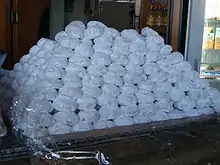Kourabiedes
Kourabiedes or Kourabiethes (Greek: κουραμπιέδες, singular: κουραμπιές, kourabies) are almond biscuits or cookies popular in Greece, Cyprus, and Greek communities in Anatolia, as well as across the Greek diaspora. They are related to numerous other biscuits known as qurabiya or similar names found in Ottoman and Persian cuisine.
 A plate of Kourabiedes in Greece | |
| Place of origin | Greece |
|---|---|
| Region or state | Greece, Cyprus, Greek diaspora |
| Associated national cuisine | Greek |
| Main ingredients | Butter, flour, sugar, almonds, powdered sugar |
| Ingredients generally used | Baking powder or baking soda |
| Similar dishes | Qurabiya, Ghoriba, Kahk |
Terminology
The Greek word kourabiedes comes from the Turkish word kurabiye,[1] which is related to qurabiya, a family of Middle Eastern cookies.
Description

Kourabiedes are a kind of shortbread with almonds. Like other shortbreads, other ingredients are butter, flour, sugar, salt, and possibly vanilla or brandy.[2]
The most common flavoring is vanilla, but other variants include Greek brandy (Metaxa is the best-known brand), mastika, or rose water. In some regions of Greece, each Christmas kourabies is topped with a clove.
Kourabiedes are shaped either into circles, crescents or balls, then baked till slightly golden. Immediately after removing the cookies from the oven, the Kourabiedes are rolled in confectioner's sugar (powdered/icing sugar) and left to cool. They are typically then rolled in powdered sugar again once cooled.[3]
Traditions
Kourabiedes are also especially popular for special occasions, such as Christmas or baptisms (christenings), though they're seen in Greece year-round.[4]
See also
Notes
- Georgios Babiniotis, Dictionary of Modern Greek, s.v.
- Tessa Kiros, Food from Many Greek Kitchens, ISBN 1741966841, p. 39
- "Kourabiedes (Greek Butter Cookies)". Archived from the original on 2012-03-17. Retrieved 2009-01-05.
- Sourligas, Christos (22 October 2019). My Big Fat Greek Cookbook: Classic Mediterranean Soul Food Recipes. Simon and Schuster. ISBN 9781510749849 – via Google Books.